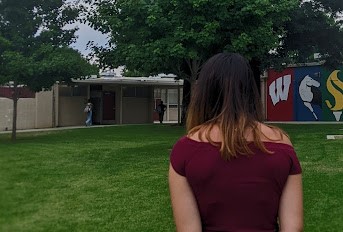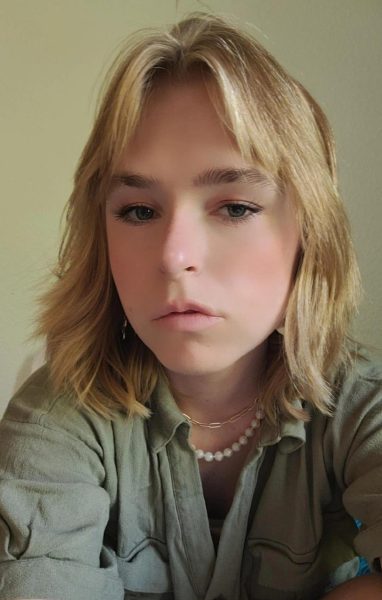Covid may be subsiding but reversing its damage to mental health is a remaining challenge
Students at Cordova High recall the virus’ impact on their lives

Cordova High sophomore Emily McCoy said Covid seriously impacted her life. Photo by Kay Stout, Cordova High School.
September 3, 2022
The pandemic has jolted education systems for three years now and like many other schools Cordova High School educators and students have seen the extreme effects COVID-19 has had on mental health.
“When students came back from basically being at home for 18 months, we saw a huge need in terms of their mental health and really their social connection,” Cordova principal Jerad Hyden said. “We need kids to learn not only skills, but content knowledge to get them through the next place in their life. But if we don’t build connections, if we don’t build relationships, if we don’t make sure that students understand that we care, that we value them, then I think we’ve missed a big opportunity.”
School is a place for growing emotionally and mentally, but students have lost that growth in these past years.
“I used to be a really social person and then when Covid happened, I got really antisocial,” sophomore Emily McCoy said. “I had horrible anxiety around people, and so now I tend to stick to small groups of people. I got severely depressed, I still am. It’s not fun. Being alone just messed with me mentally.”
For sophomore Mariana Bradbury, the harmful effects extended to her academic performance.
“It was pretty negative, especially with the way they did distance learning,” Bradbury said. “It caused my grades to drop badly. So that also took a toll on my mental health. I don’t think I learned anything from (a former class) necessarily and I don’t remember anything, it was more just like trying to get through the year, and stuff like that. I don’t remember getting (any) social experiences either.”
Jadria Newby, a Cordova mental health specialist, said there’s a kind of discomfort for students and adults who are returning to campus in a more “normal” way.
“We are so used to being home for so long that last year, people were kind of awkward. It felt weird. Even staff members (felt socially awkward), like it’s I think we’re all just learning to be social again.” Newby said.
Staff are working hard to support students as they try to recover, and the answer some think will get us through is for students to understand that their ideas are welcomed.
“If I’m working for students, then why would students not have a big voice in what I do, and how I can do it better.” Hyden said.
According to the New York Times, school children may need three to five years or more to catch up to where they would have been without the pandemic. Researchers looked at the math and reading test scores of more than eight million children; high schools were not covered in the report. School officials believe that we can close the academic gap, but say if we are to succeed we have to nurture students’ mental health and self-confidence.
“I have no doubt that we can regain that and we can get back to pre-Covid, if you will, in terms of achievement,” Hyden said. “I think the bigger issue is less about our capacity and more about if (students) are able to understand that they are capable. You guys are at an age where we have the most technology, we have the most information, we have the most access. All of those things are going to make the smartest group of kids that we have ever seen.
“That’s kind of where my concern is, if kids don’t feel like they’re capable, then they never will. “We have to figure out how we can help kids value themselves. How can we help them take risks, how can we help them understand that failure is not failure unless you stop trying.”
Fortunately, one of the results of the pandemic is that mental health is being tackled in ways it hadn’t been before. Society is cheering now for those who advocate for mental health.
“I think we need to kind of switch gears,” said Newby, the mental health specialist, “and focus on things (that are important). We still need to catch up on the emotional part of things.”

